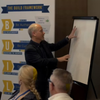What Does It Really Take to Be a Successful Salesperson? The Answer Is Simpler Than You May Think. What is at the heart of being a successful salesperson? The answer is simple: meeting the needs and wants of the other person at their level. The "how" is the important part.
By John Peitzman Edited by Chelsea Brown
Opinions expressed by Entrepreneur contributors are their own.
In many cases, salespeople get a bad rap. And the number one reason most people state for not liking salespeople is that they push their agenda without listening to, acknowledging or meeting the needs and wants of the consumer. This disconnect is commonplace in many interactions between customers and service providers. In fact, these are prevalent complaints in many relationships. Addressing this overall disconnect really just comes down to the fundamental principles of healthy relationship-building, where the core goal should be to establish authentic, worthwhile engagement. This should, in fact, be the same fundamental goal of a great salesperson.
What is at the heart of being a successful salesperson? The answer is simple: meeting the needs and wants of the other person at their level. The "how" is the important part. Active listening is critical. Setting aside your agenda is important. Engendering a sense of trust and competency is vital — and, ultimately, directly addressing the needs and wants of the other person in a holistic manner.
According to The Brevet Group, only 13% of customers believe a salesperson can understand their needs. That means, despite over one trillion dollars being spent on sales forces each year, 87% of customers don't feel the salespeople with whom they interact can understand their needs.
The truth is, nearly everyone is a salesperson. Doctors sell patients on their expertise and quality of care. Coaches sell their athletes on their competency and abilities. Teachers are selling students on the content they are teaching, the importance of the material and their ability to prepare students for the future. Parents are selling their kids on the principles they are trying to instill and the value of their direction and intentions. Even in relationships, we are selling the other person on our love, interest in their well-being and our worth. But there is a common thread and important indicator in all of these scenarios that distinguishes healthy, authentic selling from agenda-driven, self-serving tactics — and that is trust. If you are selling from a genuine place, you are simply trying to establish trust. That is, in fact, the only thing you are selling. If a person trusts you, they will gravitate toward you.
Thus, in any scenario where selling is present, the focus should be on relationship-building. And what better way to build a relationship than to establish trust? Here are six simple steps any salesperson can take to build a relationship through trust:
Related: 7 No-Brainer Strategies to Close More Sales by Getting Customers to Trust You
1. Make connectivity your only agenda
Interpersonal connectivity is the one-on-one bond you form with another person. The key to interpersonal connectivity is empathetically positioning yourself to meet the needs and wants of the other person. This requires you to be focused on them, not an alternative agenda. Making an authentic connection is key to establishing trust and building a relationship.
2. Listen
The only way to know what someone needs or wants is to listen to them. Most of us have had the experience of poor bedside manner when we visit a doctor. We wait for an interminable period of time. We are then rushed in. Our rudimentary vitals are taken. The nurse asks some perfunctory questions. And the doctor swoops in for a minute or two, peruses the nurse's notes and then makes a determination with almost no constructive engagement. And, hopefully, we have all experienced the alternative, wherein a doctor takes a few minutes to talk and listen to us. There is no question about which model leads to more trust and engagement.
Related: How to Turn a Single Sale Into a Longstanding Relationship
3. Respond to what you hear
It is one thing to listen well; it is another to respond to what you hear rather than pushing your agenda. Demonstrating that you have heard and are addressing the information someone has shared with you sends the genuine message that the interaction is about them and their needs and wants, not what you are selling.
4. Observe and respond to what you don't hear
Many of us are so used to being rushed, pressured and ignored by salespeople that we tend to freeze up or hold our tongues instead of expressing our needs and wants. As a salesperson, you can forge a bond by watching people and asking them questions based on what you observe. "What are you hoping to accomplish?" "How can I help?" "What information do you feel is important for me to know?" Remember that this experience should be about them, not you.
Related: Prioritizing Relationships Over Sales
5. Provide a choice of "yeses"
Too often, sales are looked at in black and white. You either closed or you didn't. But the reality is that it often takes an average of eight touches with the same person to make a sale. This means that the question should not be whether or not you closed the sale, but how you are positively engaging with the person to generate ongoing touches and grow your relationship. It isn't about "yes" or "no." It is about "yes" or "yes" — not the sale being the goal. It is about building and establishing a trusting relationship, regardless of the sale.
Being a great salesperson isn't about meeting quotas or closing a customer on any given day. It is about laying the foundation to build a relationship with someone so that they trust you for their future needs, recommend you to others and want to engage with you on a long-term basis.










